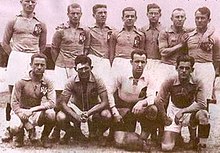Yugoslav-Portuguese relations

|
|
|
|
|
| Portugal | Yugoslavia |
, The Yugoslav-Portuguese relations include intergovernmental relations between the former Yugoslavia and Portugal . It went back to the 1917 established diplomatic relations between the Kingdom of Serbia and the Republic of Portugal.
Relationships were mostly not very intensive and were largely limited to contacts in culture and sport, and both countries were members of a number of multilateral organizations, such as the GATT , the CSCE (now the Organization for Security and Cooperation in Europe , OSCE) and the UN Organizations such as UNESCO , the International Labor Organization, etc. a.
Lisbon and Zagreb formed the first Yugoslav-Portuguese city friendship in 1977 with a cooperation agreement .
history
Portugal and the Kingdom of Serbia established diplomatic relations on October 19, 1917, which continued after the establishment of the Kingdom of Yugoslavia in 1918.
After the occupation of Yugoslavia by the German Wehrmacht in 1941, neutral Portugal under the dictator Salazar recognized the government-in-exile of Yugoslav King Peter II .
After the end of the Second World War in 1945, socialist Yugoslavia established itself . The strictly anti-communist Salazar regime in Portugal did not enter into any official relations with the new government.
After the Carnation Revolution in 1974 and the subsequent end of the Estado Novo dictatorship, the new Portuguese government resumed diplomatic relations with Yugoslavia on June 10, 1974.
These official relations continued after the establishment of the Federal Republic of Yugoslavia in 1992 and the following Community of Serbia and Montenegro in 2006 .
As a NATO member, Portugal was actively involved in the bombing of the Federal Republic of Yugoslavia in 1999 . Portuguese media reported on the spot about the conflict, which in public opinion increased the rejection of Portuguese participation. As a result, Portugal cut back its participation and regretted its commitment.
diplomacy
Portugal did not have its own embassy in Yugoslavia for a long time until it opened its first representation in Belgrade in 1977, which is still in place today.
Yugoslavia had an embassy in the Belém district of Lisbon , which today houses the Serbian embassy.
Town twinning
Culture
At the Eurovision Song Contest in Zagreb in 1990 , Portugal finished 20th, host Yugoslavia came in seventh.
Filmmakers from both countries were regular guests in the other country. In 1998 , the Yugoslav director Miloš Radović received an award at the most important short film festival in Portugal, the Curtas Vila do Conde .
The Yugoslav writer Dejan Tiago Stanković , born in Belgrade in 1965, moved to Lisbon in 1996, where he has been working as an author and Portuguese - Serbo-Croatian translator since then and now also writes in Portuguese himself.
Sports
The Yugoslav national soccer team and the Portuguese team met five times, for the first time in Amsterdam on May 29, 1928 at the Olympia 1928 . Portugal won 2-1. Overall, Yugoslavia won two and Portugal three games.
The Yugoslav and Portuguese women's national football teams have not met.
Occasionally, Yugoslav players also played for Portuguese clubs, such as national goalkeepers Petar Borota and Tomislav Ivković . Zoran Filipović worked both as a player and later as a coach for various Portuguese clubs. National player Branko Stanković was under contract with FC Porto in 1975/76 , national player Budimir Vujačić played for Sporting Lisbon for four years from 1993 , where he won the national cup in 1995 .
Web links
- Film footage from the first Portugal-Yugoslavia soccer match in 1928 , two-minute video clip on YouTube
Individual evidence
- ↑ a b Overview of diplomatic relations with Serbia on the website of the Diplomatic Institute of the Portuguese Foreign Ministry , accessed on May 4, 2019
- ↑ Overview of the Lisbon city partnerships at the umbrella organization of the Portuguese district administrations (ANMP), accessed on January 1, 2018
- ↑ Live report during a battle in Kosovo , recording of a television report by the RTP on YouTube , accessed on January 1, 2018
- ↑ NATO-member Portugal wants to withdraw troops from Kosovo , article from October 24, 2000 at www.iacenter.org, accessed on January 1, 2018
- ↑ Overview of the Yugoslav-Portuguese town twinning at the Association of Portuguese District Administrations (ANMP), accessed on August 29, 2019




